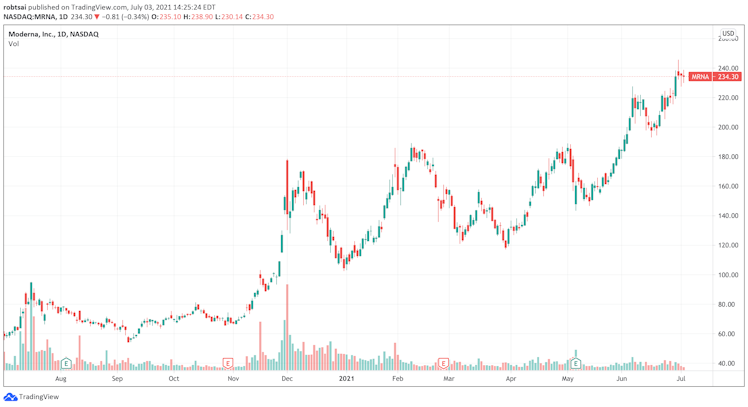Trending Assets
Top investors this month
Trending Assets
Top investors this month
What mRNA is good for and what it maybe isn't
Over on Science, Derek Lowe's latest is a must read: link
My notes:
Big players like Moderna and BioNTech (Pfizer partner) dominate, while CureVac failed on now Sanofi wants to get in on the action (vaccine failed and was only 47% effective)
Moderna was originally going to be a therapy company (pump people up with mRNA to treat them) and not as a vaccine company. Vaccines are great as you leverage the immune system to have a memory and fight off viruses after the injection. Ongoing therapeutics are tough - how often do you keep injecting people with mRNA? You're using mRNA to make proteins - which the immune system may try to fight! And what if the reaction is severe - in a quest to solve one ailment you cause another!
Targeting is difficult - liquid nanoparticles that deliver mRNA "pile up in the liver" - so low hanging fruit is to work on the retina (things stay there and don't go to the liver) or target liver diseases.
CRISPR dominates in treating certain genetic diseases - because using mRNA to target people whose genes make bad proteins in order to deliver good proteins means you still have the bad proteins lying around, but if you CRISPR, you fix the problem at the source - and the body no longer makes bad proteins and only good ones. CRISPR for the win!
What else could mRNA fix? Alzheimer's forget it - we don't know what causes it.
What about monocolonal antibodies?
Apparently that's being looked at:
CAR-T chimeric antigen receptor T-cell therapy is promising.
As you can tell from the name, that’s not an antibody-driven approach at all, but rather uses T cells on the attack, and instead of a vaccination to rouse them (which hasn’t really worked), it’s a much more laborious procedure that engineers a patient’s own T cells to deliberately recognize some particular surface antigen on the targeted cancer cells. It works for some kinds of leukemia (and not always then), and the successes are due partly to leukemia cells being individually accessible out in the bloodstream, and very much because some key antigens have been identified that lets these cells be specifically attacked. Even then, your leukemia cure likely comes at the cost of permanently impairing the population of the leucocytes involved. That’s a real concern, but if you’re to the point of doing CAR-T your alternative is basically death within months, so it’s a worthwhile trade. Naturally, people are working on other specific ways to mobilize T cells as well.
Check out the 1 yr chart of MRNA

BioMed Central
How mRNA therapeutics are entering the monoclonal antibody field - Journal of Translational Medicine
In 1975, Milstein and Köhler revolutionized the medical world with the development of the hybridoma technique to produce monoclonal antibodies. Since then, monoclonal antibodies have entered almost every branch of biomedical research. Antibodies are now used as frontline therapeutics in highly divergent indications, ranging from autoimmune disease over allergic asthma to cancer. Wider accessibility and implementation of antibody-based therapeutics is however hindered by manufacturing challenges and high development costs inherent to protein-based drugs. For these reasons, alternative ways are being pursued to produce and deliver antibodies more cost-effectively without hampering safety. Over the past decade, messenger RNA (mRNA) based drugs have emerged as a highly appealing new class of biologics that can be used to encode any protein of interest directly in vivo. Whereas current clinical efforts to use mRNA as a drug are mainly situated at the level of prophylactic and therapeutic vaccination, three recent preclinical studies have addressed the feasibility of using mRNA to encode therapeutic antibodies directly in vivo. Here, we highlight the potential of mRNA-based approaches to solve several of the issues associated with antibodies produced and delivered in protein format. Nonetheless, we also identify key hurdles that mRNA-based approaches still need to take to fulfill this potential and ultimately replace the current protein antibody format.
Already have an account?